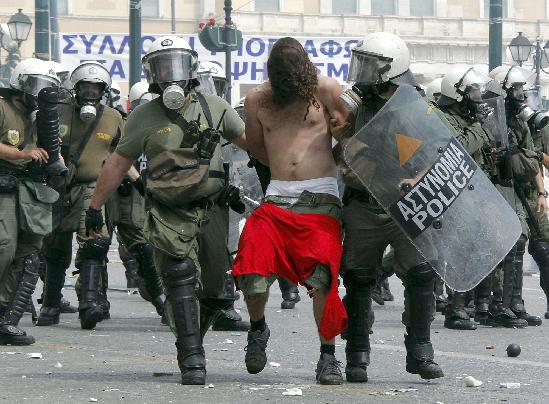Global Biz
EU put next tranche of loans for Greece on hold
(Xinhua)
Updated: 2011-06-20 10:35
 |
Large Medium Small |
|
 Riot police detain a demnstrator during anti-austerity protests in Athens, June 15, 2011. [Photo/Agencies] |
LUXEMBOURG - Eurozone finance ministers put the next tranche of loans for Greece on hold after talks dragged into the early hours of Monday, asking Athens to approve new austerity measures first.
The ministers of the 17 European Union (EU) countries that use the euro said the disbursement of the next tranche of loans would depend on the outcome of the ongoing negotiations between the Greek government and the EU, in liaison with the International Monetary Fund (IMF), and it would also hinge on the adoption of new austerity measures by the Greek Parliament.
"This, together with the passing of key laws on the fiscal strategy and privatization by the Greek parliament, will pave the way for the next disbursement by mid-July," they said in a statement after seven-hour marathon talks.
The fifth tranche of loans, which amount to 12 billion euros ($16.9 billion), was originally planned to be handed to Greece this month so that Athens could pay back its maturing debts, but it was held off due the country's failure to meet austerity targets.
It was part of the 110-billion-euro (157-billion-dollar) bailout program supplied by the EU and the IMF to keep Greece afloat in May last year. In exchange for the financial support, Athens has to implement austerity measures and economic reforms to bring down its fiscal deficits.
If Greece could not get the next tranche of loans in time, it would be unable to pay its debts maturing in July and face the imminent risk of default.
Greek Prime Minister George Papandreou reshuffled his cabinet on Friday in a risky bid to drum up support for the new austerity package he introduced early this month to convince the EU and the IMF to release the next tranche of loans.
The new belt-tightening measures have led to violent protests and waves of strikes in the past week, casting doubt on whether the Greek Parliament could give its urgently-needed approval to win new loans from the EU and the IMF.
| 分享按钮 |